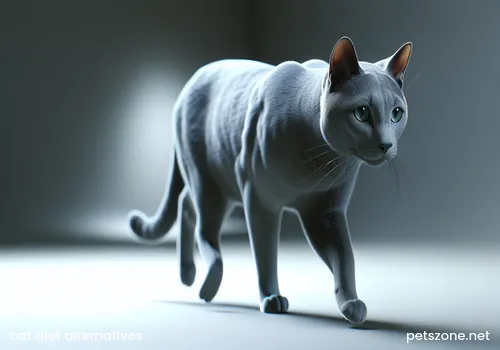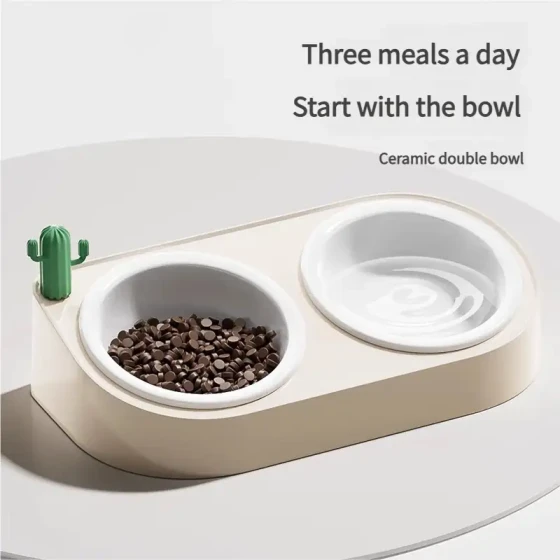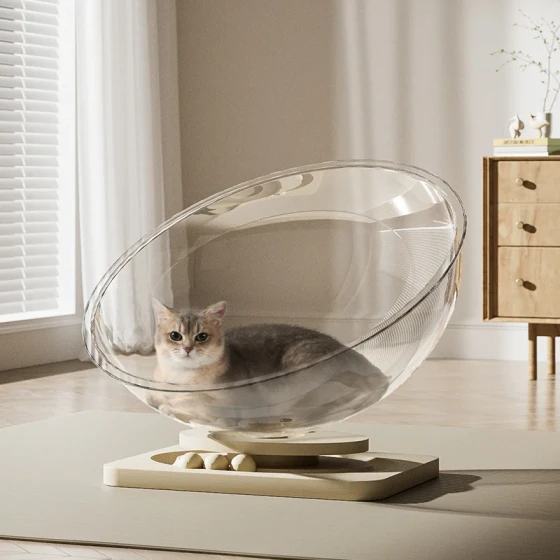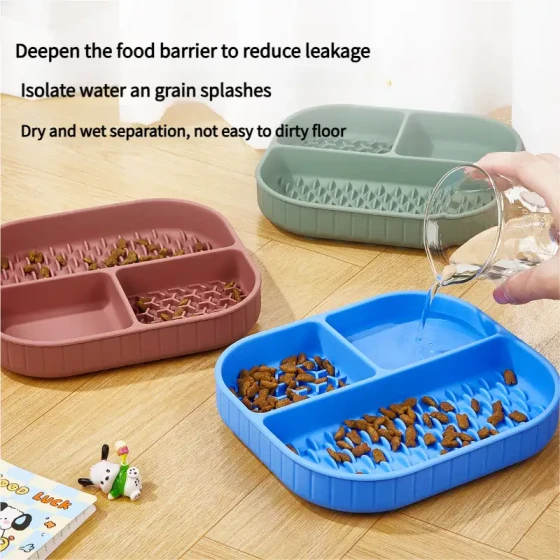What else can cats eat besides cat food_10 alternative healthy diet options for cats
For many “pooper scooper owners,” cats are not just pets but indispensable family members. We all want to give them the best care, and diet is one of the most important aspects. Although there are many types of cat food on the market with balanced nutrition that are the best choice as staple food for cats, sometimes for various reasons, or simply to improve the “master’s” meals, we may consider what else can be fed to cats besides cat food.

Cats are pure carnivores; their body structure and physiological needs require them to obtain all necessary nutrients from animal-based foods. This means cats' diets need to be rich in protein, specific fatty acids, vitamins, and minerals. However, humans eat a wide variety of foods, many of which may be not only unhelpful but even harmful to cats. Therefore, when considering foods beyond cat food, understanding which foods are safe and beneficial for cats is essential.
Besides cat food, these 10 foods can be healthy “extras” for cats
Although cat food is the basis for a balanced diet for cats, in specific situations or as occasional treats, some human foods, after proper preparation, can be safely fed to cats and may even provide additional nutritional supplementation. Remember, “moderation” and “no seasoning” are key, and these foods cannot replace staple cat food.
- Cooked lean meat: Cooked lean meats such as chicken, turkey, beef, and lamb provide excellent high-quality protein for cats. Be sure to cook thoroughly and completely remove bones, skin, and any seasoning, especially salt, onions, and garlic which are harmful to cats. Raw meat may contain parasites and bacteria, so feeding raw should be avoided.
- Cooked fish: Cats generally like the taste of fish, which is rich in omega-3 fatty acids beneficial for cats' skin, fur, and overall health. Choose cooked fish with no seasoning, such as salmon, tuna (water-packed, no salt), mackerel, etc., and ensure all bones are removed. Because some fish have high mercury levels and long-term excessive feeding may cause vitamin E deficiency, fish should be given only as occasional treats.
- Cooked eggs: Cooked eggs are a good source of high-quality protein and various vitamins for cats. Both cooked yolk and white can be fed, but make sure the egg is fully cooked to avoid the risk of salmonella.
- Plain unsweetened yogurt: Some cats can consume plain, unsweetened yogurt in moderation. Probiotics in yogurt may benefit cats' gut health. However, not all cats digest dairy well (most adult cats are lactose intolerant), so introduce in small amounts and observe the cat's reaction.
- Cooked pumpkin puree: Pure pumpkin puree without added sugar or seasoning is high in fiber, aiding cats’ digestive health, and may help relieve constipation or hairball issues.
- Cooked carrots: Cooked carrots contain beta-carotene and vitamin A, beneficial for cats’ vision and immune system. Cook carrots and cut into small pieces for feeding, as raw carrots are harder to digest.
- Small amounts of cooked leafy greens: Small amounts of cooked spinach, peas, green beans, and other leafy greens can provide extra vitamins and fiber. Serve cooked and cut into small pieces.
- Small amounts of whole grains: Cooked oatmeal, brown rice, and other whole grains can provide some fiber and vitamin B. Make sure they are plain, unseasoned, and fed in small amounts.
- Small amounts of fruit (seedless and peeled): Some fruits like blueberries, seedless and peeled apples, small amounts of watermelon (seedless) are rich in antioxidants, fiber, and vitamins. Always remove seeds and peels when feeding, as they may be hard to digest or contain harmful substances. Grapes and raisins are toxic to cats and must never be given.
- Pure meat cans/cat treat cans: Choosing simple ingredient pure meat canned food or specially formulated treat cans for cats, grain-free and free of harmful additives, can supplement beyond regular cat food.
These foods are “no-go zones” for cats—never feed!
Knowing which foods are safe for cats is equally important; avoiding the “minefields” is fundamental to ensuring cats’ health. Some commonly used human foods can be fatal poisons for cats.
- Chocolate and caffeine: The theobromine in chocolate is toxic to cats, and caffeine can cause poisoning, potentially leading to abnormal heart rhythms, seizures, or even death.
- Onions, garlic, and related plants: Onions, garlic, chives, etc., contain sulfur compounds that destroy cats’ red blood cells causing hemolytic anemia. Whether raw, cooked, or powdered, they are unsafe.
- Grapes and raisins: These may cause kidney dysfunction or acute kidney failure in cats. The cause is unclear but any amount should be avoided.
- Alcohol: Even very small amounts of alcohol are extremely dangerous to cats and may cause alcohol poisoning, coma, or death.
- Raw meat, raw fish, raw eggs: These may contain harmful bacteria (such as salmonella and E. coli) and parasites; raw fish may also destroy cats’ vitamin B1 internally.
- Bones: Cooked bones can splinter into sharp fragments that may cut or puncture cats’ digestive tracts. Although wild cats eat bones, domestic cats’ diets should avoid meat with bones as much as possible.
- Human processed foods: High salt, sugar, fat, and various additives and preservatives in human foods can burden cats’ health. Long-term feeding may cause obesity, kidney issues, and digestive problems. In particular, human tuna cans usually have high salt content and unbalanced nutrition, unsuitable as cat staple food or in large amounts.
- Milk and most dairy products: Most adult cats lack enzymes to digest lactose; ingestion of milk or dairy often causes diarrhea and digestive upset. Special cat goat milk powder is an exception.
- Dough: Raw dough ferments in cats’ stomachs producing gas, causing bloating, pain, and possibly alcohol poisoning.
- Macadamia nuts: May cause weakness, depression, vomiting, tremors, and increased body temperature in cats.
- Foods containing xylitol: Xylitol is a sugar substitute toxic to cats, possibly causing liver failure.
Precautions when feeding cats alternative foods
Although we have learned about some “foods beyond cat food” that cats can eat, there are some crucial precautions to remember in practice:
- Start with small amounts and gradually increase: When feeding a new food for the first time, start with a very small amount and observe whether the cat shows vomiting, diarrhea, or other discomfort. Only increase gradually once the cat fully adapts.
- Use as a supplement, not staple food: Cat food is scientifically formulated to meet all nutritional needs. Human foods should only complement cat food or be occasional treats and cannot replace cat food. Usually, snacks and supplements should not exceed 10% of the cat’s daily calorie intake.
- Always cook thoroughly and avoid seasoning: When feeding meats, fish, eggs, etc., they must be fully cooked without any salt, sugar, oil, spices, or other seasonings. These seasonings are harmful and offer no benefit to cats’ bodies.
- Ensure food safety: Food must be fresh and clean, avoiding spoilage or contamination.
- Observe cat’s reaction: Every cat is a unique individual and may react differently to new foods. Closely watch the cat’s mood, appetite, bowel movements, etc., after introducing new food. If abnormal, stop feeding immediately and consult a veterinarian.
- Consult veterinarians: If unsure whether a food is suitable for your cat, or if your cat has special health conditions or dietary needs (such as kidney disease, diabetes), always consult a professional veterinarian before feeding new foods. Vets will provide the most professional advice based on the cat’s specific situation.
Frequently Asked Questions
- Can cats eat human meals?
It is not recommended to feed cats human meals directly. Human foods usually have high salt, oil, sugar, and various seasonings which may harm cats’ health. - Why do cats like fish?
Cats like the taste of fish possibly because fish is rich in protein and fat, aligning with their carnivorous nature. However, relying too much on fish as a staple food can cause nutritional imbalance and health issues. - Can kittens eat foods other than cat food?
Before 3-4 months old kittens can be fed kitten-specific milk powder or nutritional paste besides kitten food and canned kitten food in limited amounts. Slightly older kittens can have cooked, unseasoned meat or egg yolks added along with staple cat food but still require caution and observation. - Is it okay to make homemade cat food?
Homemade cat food requires deep understanding of cats’ nutritional needs to ensure balanced diet. Improper nutritional balance in homemade food long-term can cause malnutrition. It is recommended to prepare homemade cat food under the guidance of a professional pet nutritionist or veterinarian.
Conclusion
Cat food is a balanced staple formulated specifically for cats, providing all daily nutritional needs. Beyond cat food, we can select some properly prepared, safe, and healthy foods as occasional treats or supplements to enrich cats’ dietary experience. Cooked lean meats, fish, eggs, and small amounts of particular vegetables and fruits are good choices. At the same time, we must strictly avoid foods toxic or harmful to cats, such as chocolate, onions, grapes, and more. Before trying any new food with your cat, understand the safety of the food and always uphold the principles of “moderation,” “no seasoning,” and “observe reactions.” When necessary, consult a veterinarian’s expert advice to ensure our “fur babies” eat happily and healthily.



-560x560.webp)